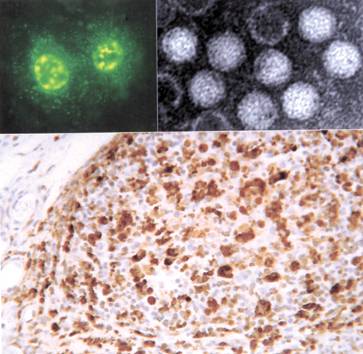| 2003 |

|
YEAR BOOK |
Department of Agriculture and Rural Development for Northern Ireland
|
Animal virus research
|

Outbreaks of exotic diseases, such as foot-and-mouth disease, require a rapid laboratory response if effective containment, control and eradication are to be achieved. VSD has substantial experience in the production of molecular-based diagnostics for several economically important viruses, much of it gained through participation in EU-funded projects and numerous international collaborations. This work involves development, standardisation and exploitation of molecular-based methods, including molecular beacon and associated technologies, for the surveillance and diagnosis of exotic virus diseases including classical swine fever, swine vesicular disease, avian influenza and Newcastle disease.
VSD research also focuses on emerging pathogens which pose a current or future threat to farmed livestock, poultry and fish. For example, it has identified a novel porcine circovirus type 2 (see Figure) as the cause of a wasting disease of pigs which has severely affected pig production in many parts of the world and has recently emerged in Ireland. Studies at VSD indicate a close association between porcine and avian circoviruses and cells of the immune system, often resulting in immunosuppression and consequent increased susceptibility to other infectious agents.
Avian circovirus research is aimed at the detection of new circoviruses in avian species and the development of improved vaccines for chicken anaemia virus, an important pathogen of poultry. Molecular methods are being used to generate attenuated vaccine candidates in this work.
Salmon pancreas disease virus, an emerging viral pathogen of farmed salmonids, was first isolated at VSD and current studies are directed towards developing vaccines for the control of this infection and the related sleeping disease virus which infects farmed trout.
Contact: Professor Bill Ellis, Acting Director, Veterinary Sciences Division, Department of Agriculture and Rural Development, Stormont, Belfast BT4 3SD;
E-mail: [email protected]